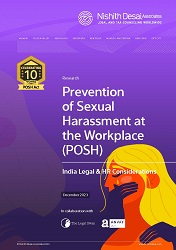New Publication: Celebrating 10 years of the Sexual Harassment of Women at Workplace (Prevention, Prohibition and Redressal) Act, 2013 (POSH Act)
Posted by By nishithadmin at 10 December, at 09 : 39 AM Print
Warning: count(): Parameter must be an array or an object that implements Countable in /web/qlc/nishith.tv/htdocs/wp-content/themes/Video/single_blog.php on line 46
Warning: count(): Parameter must be an array or an object that implements Countable in /web/qlc/nishith.tv/htdocs/wp-content/themes/Video/single_blog.php on line 52
India Legal & HR Considerations
Workplace sexual harassment not only creates an insecure and hostile working environment for women but also impedes their ability to deliver in today’s competing world. This year marks the 10th anniversary of India’s first legislation specifically addressing the issue of workplace sexual harassment; the Sexual Harassment of Women at Workplace (Prevention, Prohibition and Redressal) Act, 2013 (“POSH Act”) which was enacted by the Ministry of Women and Child Development, India in 2013. The Government also subsequently notified the rules under the POSH Act titled the Sexual Harassment of Women at Workplace (Prevention, Prohibition and Redressal) Rules, 2013 (“POSH Rules”). The year 2013 also witnessed the promulgation of the Criminal Law (Amendment) Act, 2013 (“Criminal Law Amendment Act”) which has criminalized offences such as sexual harassment, stalking and voyeurism. The last decade has witnessed a progressive body of jurisprudence on POSH Act. The POSH Act has been enacted with the objective of preventing and protecting women against workplace sexual harassment and to ensure effective redressal of complaints of sexual harassment. While the statute aims at providing every woman (irrespective of her age or employment status) a safe, secure and dignified working environment, free from all forms of harassment, proper implementation of the provisions of the statute remains a challenge. Although the law preventing sexual harassment at workplace has been in force since 2013, there remains lack of clarity on various aspects pertaining to the statute, including what constitutes sexual harassment, obligations of an employer, remedies/safeguards available to the victim, procedure of investigation, etc. Many are also not fully aware of the criminal consequences of sexual harassment. Therefore, the objective of this booklet is to serve as a ready reckoner to all the stakeholders and re-educate them on the law relating to workplace sexual harassment. This booklet authored by Vivek Ilawat, Nipasha Mahanta, Sayantani Saha and Vikram Shroff while celebrating 10 glorious years of the POSH law focusses mainly on the nuances of the POSH Act and other relevant laws in India pertaining to workplace sexual harassment. The objective of this booklet is to create more awareness on the issue and simultaneously equip employers in providing women a safe and secure working environment. The booklet also discusses the importance of ‘prevention’ as the best tool for elimination of this menace in a multi-cultural society as ours. Please click here to access our paper.
For any help or assistance, please email us on concierge@nishithdesai.com. Do visit us at www.nishithdesai.com.
|
Chambers and Partners Asia Pacific 2023: Top Tier for Tax, TMT, Employment, Life Sciences, Dispute Resolution, FinTech Legal
Legal 500 Asia Pacific 2023: Top Tier for Tax, TMT, Labour & Employment, Life Sciences & Healthcare, Dispute Resolution
Benchmark Litigation Asia Pacific 2023: Top Tier for Tax, Labour & Employment, International Arbitration
AsiaLaw Asia-Pacific 2023: Top Tier for Tax, TMT, Investment Funds, Private Equity, Labour and Employment, Dispute Resolution, Regulatory, Pharma
IFLR1000 2023: Top Tier for M&A and Private Equity
FT Innovative Lawyers Asia Pacific 2019 Awards: NDA ranked 2nd in the Most Innovative Law Firm category (Asia-Pacific Headquartered)
RSG-Financial Times: India’s Most Innovative Law Firm 2019, 2017, 2016, 2015, 2014
DISCLAIMER
The contents of this Publication should not be construed as legal opinion. View detailed disclaimer.







